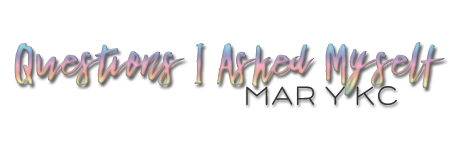Am I the skies or the sunset?
Am I the ocean or the forest?
Do I bleed when I cry,
or do I feel it when I die?
Are you eager to meet people,
or are you only friends with a couple?
Do you stay awake until sunrise,
or do you tell your mom some white lies?
Am I doing this all right?
Tell me to change, I might.
Are you scared of the unknown,
or just scared for your own?
Are you willing to explore the Ghost City?
Don't hear them, they have the audacity.
Do I sing when I'm happy,
or do I stay quiet in a library?
What is my favorite place?
"I'll take you there if that's the case."
When did I find love like this?
Are they normal or part of a niche?
Will you come if I ask you to?
Will you take my hand when I hand it to you?
All it takes is for you to start
All it takes is your brave heart.
This poem is entitled, "Questions I Asked Myself". I often question myself, often about bizarre things, and maybe a couple of "it doesn't matter" things. I also talk to myself a lot, to the point that I look like a crazy person, laughing suddenly because I told myself a really good joke... in my head!
These questions ask: which side are you on? Maybe you are one way, or maybe the other. Sometimes, you are not on any side at all. You are not one way or the other. You are just you.
Anyway, I hope you enjoy this month's Poetry Column and hope to see you in the next one!
Hello, lovely Prism readers, and welcome back to another edition of Representation in Media! This time, we're going over international LGBTQ+ movies to explore representation in different countries.
We'll be starting with the Kenyan movie Rafiki, which in Swahili means 'friend'. Released in 2018 and shown at the Cannes Film Festival, this movie shows the story of Kena and Ziki living in Kenya where homosexuality is illegal. They begin flirting with each other and go on numerous dates before being caught and having to hide. The inspiration for this movie comes from the short story Jambula Tree, written by Monica Arac de Nyeko, who in 2007 won the Caine Prize for short stories. The title was chosen because couples in a same-sex relationship usually have to refer to each other as friends due to homoromantic relationships being forbidden.
Rafiki was banned in Kenya due to its homosexual theme and clear intent to promote lesbianism in Kenya, contrary to the law; the film director was specifically asked to change the hopeful and positive ending, but after this didn't happen the ban was implemented. Even owning a copy of the movie is against the law. A temporary lift occurred in 2018 to allow the movie to partake in the Academy Award for Best Foreign Language Film at the 91st Academy Awards, though it did not win. The movie can be watched in both Swahili and English, making it more accessible for those who prefer movies in English.
Next up is Tomboy, a French drama film that follows the 10-year-old Laure and their experimentation with gender expression. After moving to a new neighbourhood, Laure introduces themself as Mickael to the kids in their building, acting as if they are a boy. This is discovered when their mom forces them to wear a dress and apologize for hitting one of the other kids. Quickly, all the other kids turn on Laure/Mickael, trying to figure out whether they are a girl or a boy. The writer has not confirmed whether the story is supposed to be about a transgender boy or simply a girl enjoying 'boy' clothes and activities. It was nominated for the GLAAD Media Award as Outstanding Film - Limited Release, and has won multiple other awards such as the Teddy Award of 2011, which was given out at the Berlin Film Festival to the movie with the best LGBT themes. The whole movie is in French, and from what I can find, it's only been released with subtitles (no dubs) elsewhere in the world.
With this, we've rounded up this round of media representation again. There are many LGBTQ+ movies even in other languages, and I'd urge everyone to explore more than just these two. Thank you for reading this month's issue, and we'll see you next time!

